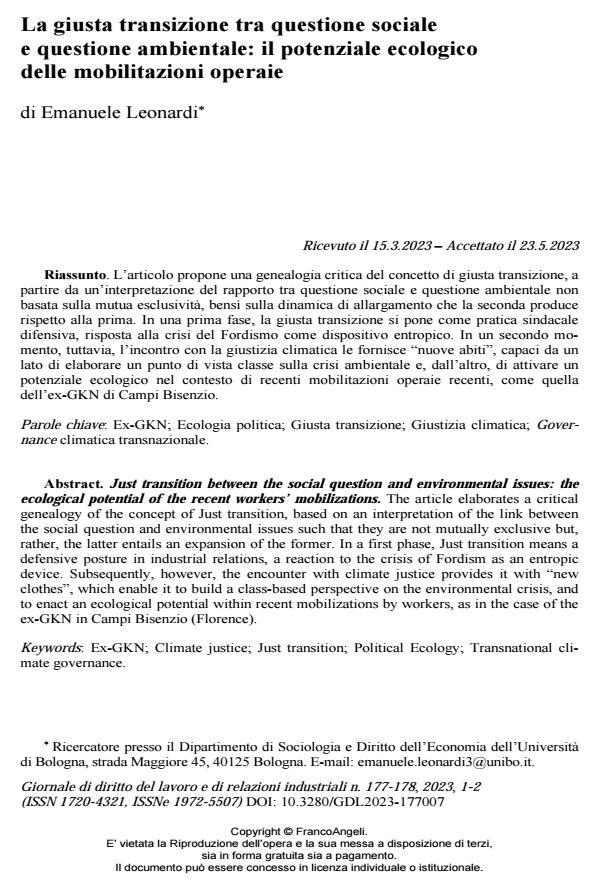Just transition between the social question and environmental issues: the ecological potential of the recent workers’ mobilizations
Journal title GIORNALE DI DIRITTO DEL LAVORO E DI RELAZIONI INDUSTRIALI
Author/s Emanuele Leonardi
Publishing Year 2023 Issue 2023/177-178
Language Italian Pages 26 P. 99-124 File size 398 KB
DOI 10.3280/GDL2023-177007
DOI is like a bar code for intellectual property: to have more infomation
click here
Below, you can see the article first page
If you want to buy this article in PDF format, you can do it, following the instructions to buy download credits

FrancoAngeli is member of Publishers International Linking Association, Inc (PILA), a not-for-profit association which run the CrossRef service enabling links to and from online scholarly content.
The article elaborates a critical genealogy of the concept of Just transition, based on an inter-pretation of the link between the social question and environmental issues such that they are not mutually exclusive but, rather, the latter entails an expansion of the former. In a first phase, Just transition means a defensive posture in industrial relations, a reaction to the crisis of Ford-ism as an entropic device. Subsequently, however, the encounter with climate justice provides it with “new clothes”, which enable it to build a class-based perspective on the environmental crisis, and to enact an ecological potential within recent mobilizations by workers, as in the case of the ex-GKN in Campi Bisenzio (Florence).
Keywords: Ex-GKN; Climate justice; Just transition; Political Ecology; Transnational climate governance.
- Democrazia in questione: partecipazione e relazioni industriali in ECONOMIA E SOCIETÀ REGIONALE 3/2024 pp.7
DOI: 10.3280/ES2023-003001 - La Just Transition come strategia partecipativa del lavoro: sapere operaio e democrazia economica nella vertenza ex GKN Francesca Gabbriellini, Emanuele Leonardi, in ECONOMIA E SOCIETÀ REGIONALE 3/2024 pp.53
DOI: 10.3280/ES2023-003004 - Il territorio soggetto vivente Emanuele Leonardi, pp.182 (ISBN:979-12-215-0781-2)
- Exploring the nexus between social and environmental sustainability within EU organic agriculture: a systematic literature review Giulia Magnano, Luca Falasconi, Claudia Giordano, in Frontiers in Sustainable Food Systems 1502085/2024
DOI: 10.3389/fsufs.2024.1502085 - Toward a just circular economy: conceptualizing environmental labor and gender justice in circularity studies Mario Pansera, Stefania Barca, Bibiana Martinez Alvarez, Emanuele Leonardi, Giacomo D’Alisa, Teresa Meira, Paul Guillibert, in Sustainability: Science, Practice and Policy 2338592/2024
DOI: 10.1080/15487733.2024.2338592
Emanuele Leonardi, La giusta transizione tra questione sociale e questione ambientale: il potenziale ecologico delle mobilitazioni operaie in "GIORNALE DI DIRITTO DEL LAVORO E DI RELAZIONI INDUSTRIALI " 177-178/2023, pp 99-124, DOI: 10.3280/GDL2023-177007